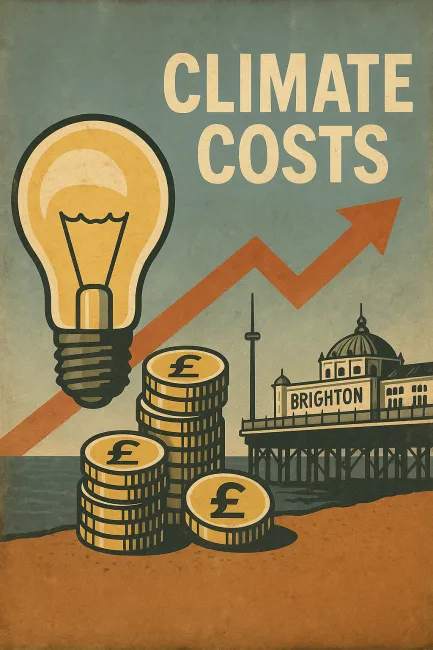
Brighton & Hove City Council just picked up an “A” grade from the CDP (Carbon Disclosure Project). Apparently, this means the city is leading the way on climate action. In practice, it means the council is very good at filling in forms, holding stakeholder meetings, and publishing glossy strategies, while failing at the basics that matter to residents.
They call it “bold leadership.” I call it two decades of political self-indulgence and pandering. First the Greens, now Labour, a conveyor belt of ideological governance that has prioritised international applause over local accountability. Whether the policies come from an environmental textbook or a socialist manifesto, the result has been the same: sky-high costs, crumbling infrastructure, and a city slowly falling apart under the weight of its own lofty ambitions.
The latest spending spectacle? Electric vehicle charging. In 2024 Brighton proudly declared itself the city named number one for electric vehicles. A few years ago, a public EV charger cost around £6,000. Now, installing a single rapid charger costs upwards of £30,000. That’s public money, spent not on frontline services, but on infrastructure for a tiny elite. EV ownership, despite seeing a very slow increase in wider use, still remains an extremely niche alternative even among the UK's elite. And those figures are even lower among working class families and renters, who make up the backbone of this city. These are the same residents being hit with record council tax increases and soaring bills. They can talk of electric vehicles being the future, but the people of the present are paying the price for these grand ideological visions.
Who is this policy for? It’s not for the pensioner taking the Number 5 bus. It’s not for the care worker priced out of their own neighbourhood. It’s not for the delivery driver trying to afford diesel. It’s for the loudest, most indulged voices in the room, and Labour’s administration is only too happy to prioritise them.
And then there’s the i360. The vanity tower on the seafront that promised prosperity and delivered embarrassment, and debt. Built on a £36 million council-backed loan. Quietly written off in January 2025 to the tune of £51 million. No recovery. No accountability. Just another taxpayer-funded monument to the failure of leadership-by-slogan. And, the taxpayer has to repay a £32 million loan to the Public Works Loan Board at approximately £2.2 million annually until 2041. Think what that money could do!
Meanwhile, the things that actually affect people’s lives get worse. The average private rent in Brighton is now almost £1,500 a month, up by nearly 9% in a year. Council tax has been pushed to the legal limit again. Food prices keep rising. Energy bills, even after a cap reduction, remain £600 higher than before the crisis. And the council’s response? Another strategy document. Another net zero vision. Another photo-op next to a solar panel.
Brighton doesn’t have a climate problem. It has a competence problem. And it has a political problem. After years of Green experiments and Labour dogma, residents are paying more and getting less, because the people in charge are more interested in scoring points and patting themselves on the back than solving problems that affect everyday people. The same people who are the actual backbone and future of the city.
This city doesn’t need another consultant report. It needs its roads repaired. Its housing made affordable. Its services restored. It needs a council that respects the people who pay the bills, not the global organisations that hand out meaningless awards.
Leadership means putting local people first. It means recognising that the job of government is not to reshape society according to ideology, but to deliver real, tangible, beneficial outcomes — bins collected, streets cleaned, services funded. That’s not radical. That’s responsible.
And that’s exactly what’s been missing in Brighton & Hove for far too long.